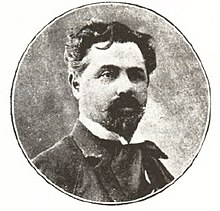Khachatur Malumian

Khachatur Malumian (Armenian: Խաչատուր Մալումյան), also known as Edgar Aknuni (Aknouni or Agnouni; Armenian: Էտկար Ակնունի) (1863 in Meghri, Russian Empire – 1915) was an Armenian journalist and political activist.
Biography[]
Khachatur Malumian gained his early education at the Nersisyan School in Tiflis.[1] He studied at Geneva University, where he became one of the close friends of Christapor Mikaelian, contributing to his Droshak Journal. In 1907 in Vienna, he was delegated to the ARF IV Conference, then in Paris he organized the General Meeting of opposite Ottoman parties for the reinstatement of the Ottoman Constitution.[2] He welcomed the Young Turk movement[3] and worked in Constantinople (now Istanbul) after 1914.
Even when the Ottoman Interior Ministry ordered that the Armenian intellectuals be deported,[4] Aknuni stayed loyal to Talaat, the Interior Minister, saying, "It’s impossible! Talaat probably doesn’t know about it!"[5]
Malumian was a victim of the Armenian genocide.[3]
Sources[]
- The Armenian Question, encyclopedia, Ed. by acad. K. Khudaverdyan, Yerevan, 1996, p. 26.
- Armenia: The Survival of a Nation
References[]
- ^ Kaligian, Dikran Mesrob (2011). Armenian organization and ideology under Ottoman rule, 1908-1914 (Rev. ed.). New Brunswick, NJ: Transaction. ISBN 1412848342.
- ^ Erickson, Edward J. (2013). Ottomans and Armenians: a study in counterinsurgency. p. 31. ISBN 1137362219.
- ^ Jump up to: a b Walker, Christopher (1980). Armenia, the survival of a nation. Croom Helm. p. 380.
Played important role in 1907 in smoothing way to Young Turk revolution; to Constantinople in 1908, where he gave enthusiastic speeches in support of the revolution.
- ^ Kévorkian, Raymond H. (2010). The Armenian genocide : a complete history (Reprinted. ed.). London: I. B. Tauris. p. 524. ISBN 1848855613.
It was, however, the 2 June departure of the six main political leaders – Rupen Zartarian, Nazareth Daghavarian, Karekin Khajag, Aknuni (K. Malumian), Harutiun Jangulian, and Sarkis Minassian – that marked the beginning of the liquidation of the Istanbul Armenian elite
- ^ Armenia: The Survival of a Nation Archived 2012-07-13 at archive.today
- 1863 births
- Armenian politicians
- 1915 deaths
- Armenians of the Ottoman Empire
- People who died in the Armenian genocide
- People from Meghri